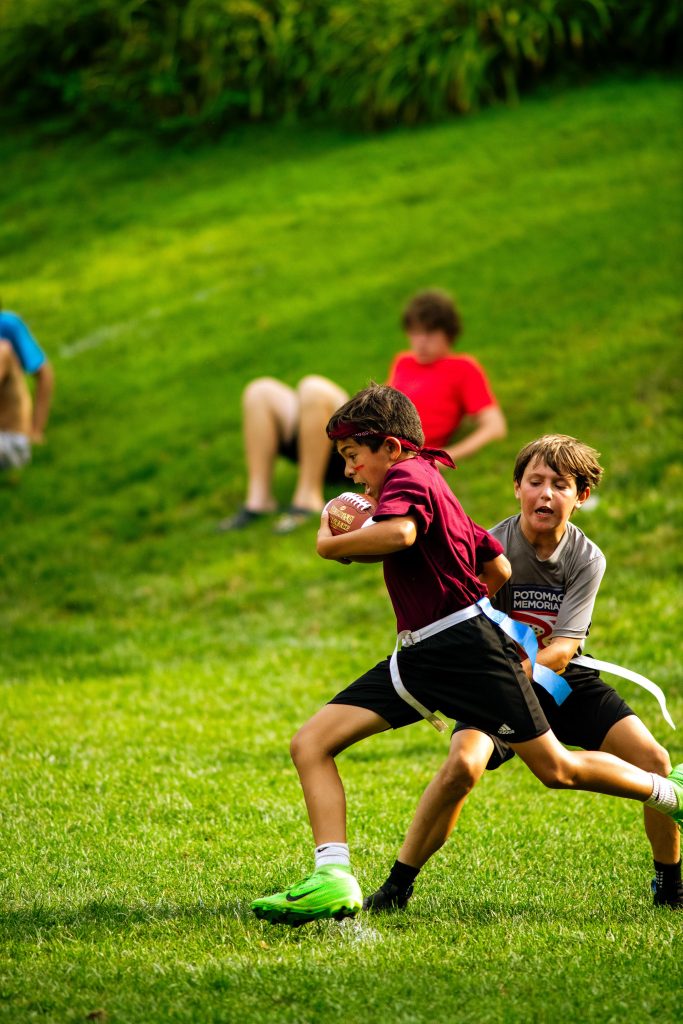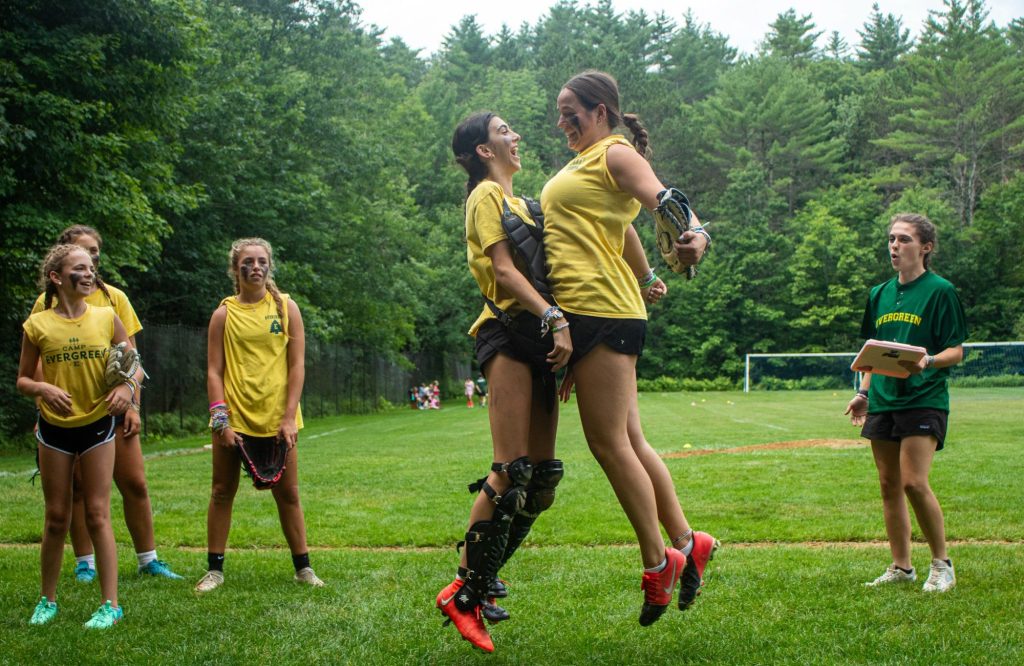
A couple of weeks ago, I wrote about my time playing rugby, even showing what it looked like for young Jack to run around like a headless winger trying to sidestep a freight train while getting completely crushed early on in my “career”.
It was in the frame of how that sport helped shape how I thought about confidence.
But it didn’t stop there, because spending years at the bottom of muddy rucks also shaped my whole deal with competition, especially where kids are concerned.
Look, I have a kinda weird relationship with competition.
Some stuff? I’m ALL IN.
Like, rugby, Settlers of Catan, Egyptian Rat Screw (weird name for simple card game), Gaga Pit – I will go all out and feel zero guilt about it.
Seriously, don’t challenge me to Cities & Knights unless you’re ready for it to get ruthless.
Other things? I couldn’t care less. Archery? I’m hot garbage. Pictionary, cup stacking, chess? Lose a lot. And that’s totally fine by me.
The difference between all of these? My investment level matches the context. Simple as that.
I’ve been thinking about this a ton as we gear up for summer, because competition is unavoidable and an awesome learning experience at camp (and oftentimes in the world).
Color war, cabin challenges, who can make the weirdest sound at lunch… kids are often keeping score, whether we admit it or not.
The Competition Dilemma
When it comes to competition, many people fall into one of two traps:
“It doesn’t matter who wins!”
This is when we jump in with “Hey, it’s just for fun!” the second a kid loses at something. A kid is clearly upset about losing the soccer game, and boom,
“Who cares who won? Everyone’s a winner!” Rushing to sweep disappointment under the rug, pretending like Ws and Ls don’t matter by not keeping score (while also fooling absolutely no one).
“It REALLY matters who wins!”
Then there’s the other extreme. This is where every T-ball game is like the World Series. Keeping stats, arguing with umps, and creating a vibe where every loss feels like the end of the world. The pressure is crazy thick, and fun takes a major backseat.
Both of these approaches are missing something huge.
When we pretend winning doesn’t matter at all, we risk gaslighting kids about their own feelings. (Spoiler alert: kids KNOW when something matters to them!)
When we make winning the only thing that counts, we’re teaching kids that their value is tied to outcomes they can’t always control.
Matching Their Gravity
What I’m trying to do all the time in these situations (and it’s something I talk a ton to staff about) is “matching their gravity.”
It’s stupid simple but works like magic:
Instead of deciding ahead of time how serious a game should be, I might just (drumroll please)… ask the kids: “How much does winning matter to you today? Like on a scale of 1-10?”
This one question does a ton:
- Says, “Hey, caring about winning is totally valid.”
- Gives kids control over the vibe.
- Tells them, “Your feelings about this actually matter to me.”
When a kid says “10”. Game on. We know this is their WHOLE WORLD right now.
When they say “3”. Let’s keep it chill.
Either way, let’s meet them right where they are, not where we think they should be.
And yeah, different kids in the same game will care different amounts. Totally fine.
We just acknowledge it: “Looks like some of you are pretty invested in winning today, and others are just here to play. Cool. Let’s make space for both.”
For me, that looks like we are playing hard and by the rules
Or let’s let this game be more chill, and then the next one be full intensity.
The key is naming how hard we are playing, so everyone is on the same page
This is what taking kids seriously actually looks like. We’re not assuming they’re all mini-Michael Jordans obsessed with winning, or that they should all just be happy little campers who don’t care about outcomes.
We’re letting them tell US what matters to THEM, and then adjusting accordingly.
If you’re enjoying this blog…subscribe to our weekly email below!
Why This Works
Kids are smart, and even if they don’t say it all the time, they notice a ton. When we acknowledge that winning matters (if it does to them), they trust us more.
When we don’t make a huge deal about a casual game, they’re cool to just have fun.
What’s great is watching kids figure out their own acute awareness about competition. Pretty quickly, they’re like, “This activity? I really care about doing well. That one? I’m just here to mess around.”
That self-awareness is a way (way, way) sophisticated skill.
Being able to recognize and name your own investment level helps kids:
- Understand their own emotions better
- Set reasonable expectations for themselves
- Respect that others might care differently
- Handle disappointment in healthier ways
It goes well beyond camp games and competition. This stuff (this framing) makes its way into academics, friendships, hobbies, careers, the workplace, everywhere. Knowing when to go all-in and when to keep it casual is basically a life superpower.
Some kids will start the summer getting upset about every competitive outcome, eventually just outright saying, “I’m feeling like a 9 out of 10 about winning this game” or “Nah, I’m just playing for fun today.”
That shift is HUGE. It moves them from being controlled by competition to having some control over how they engage with it.
And honestly? Adults could use this skill too. (Just saying. Again, watch me play Catan sometime and you’ll know what I mean.)
Bringing It Home
I’m trying this all the time, not just at camp. And I’ve seen parents try it too. My friend Sylvia often asks her daughter before soccer, simple stuff like:
“How important is winning to you today?”
Then, she matches her energy to the answer.
When they lose, or Greta (her daughter) is upset, it’s amazing to see her validate and somehow skip the life lessons (I always want to jump in with the lesson) with:
“Losing sucks sometimes. I get why you are disappointed.”
At camp, I try not to jump straight to “it doesn’t matter” when a kid is clearly upset about losing. It obviously DOES matter to them in that moment.
I love winning, so tbh this is sometimes hard for me, and I need to remind myself. But I meet them there first. Earn the right to be heard by actually hearing them.
Kids win. Kids lose. It’s just how it goes.
When we match a kid’s level of investment instead of imposing our own, we’re letting them know their feelings matter, even when we don’t share them.
Kids are constantly calibrating how much different things matter to them. A lot of the time, our job isn’t to tell them what should matter, but to help them navigate what does matter to them.
Sometimes that means letting winning matter. Sometimes it means helping them laugh off a loss. Or it might just mean starting where they are, not where I think they should be.
Let’s do this,
Jack
PS: I am on a mission to better understand K&E from your perspective. If you have a few minutes I’d love to chat. Just send me a message saying “Hey Jack let’s chat.”










